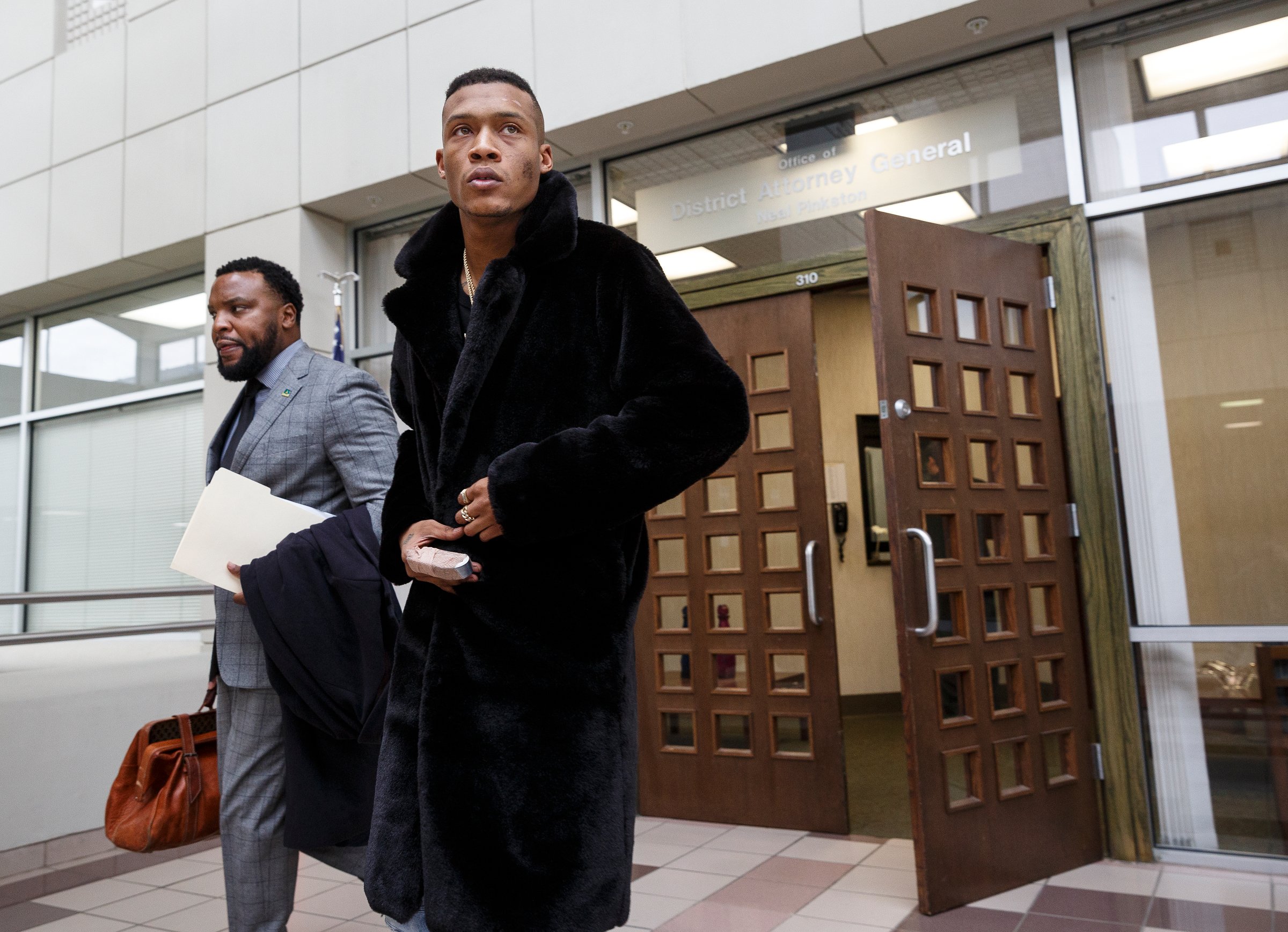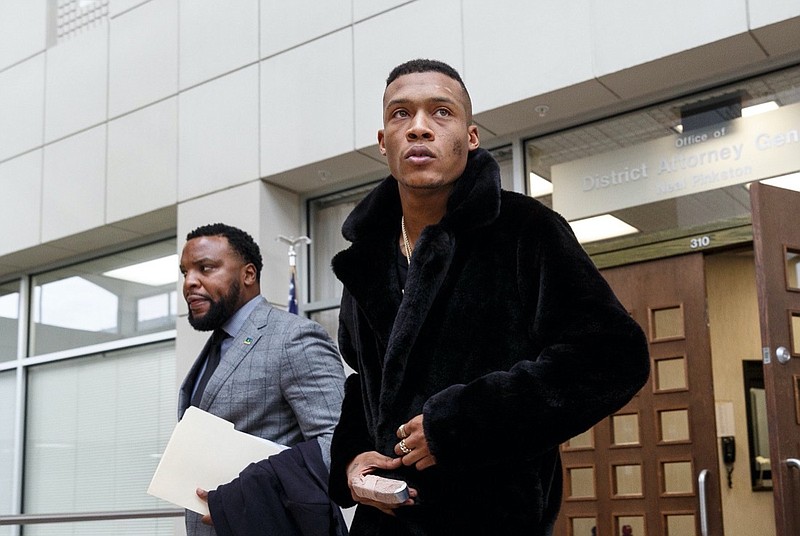 Staff photo by Doug Strickland / Charles Toney Jr., right, and his attorney S. Lee Merritt leave a meeting with District Attorney Neal Pinkston before a news conference at the Hamilton County-Chattanooga Courts Building on Thursday, Dec. 13, 2018, in Chattanooga, Tenn. In the news conference, Merritt called for the firing of Hamilton County sheriff's deputies who were filmed punching and kicking Toney and for the district attorney's office to drop criminal charges against him.
Staff photo by Doug Strickland / Charles Toney Jr., right, and his attorney S. Lee Merritt leave a meeting with District Attorney Neal Pinkston before a news conference at the Hamilton County-Chattanooga Courts Building on Thursday, Dec. 13, 2018, in Chattanooga, Tenn. In the news conference, Merritt called for the firing of Hamilton County sheriff's deputies who were filmed punching and kicking Toney and for the district attorney's office to drop criminal charges against him.Hamilton County sheriff's detective Blake Kilpatrick, who has been under federal investigation since 2018 after a viral video showed him punching and kicking a handcuffed Black man, is asking a federal judge to put a civil lawsuit on hold as the criminal investigation continues.
A bystander filmed part of the Dec. 3, 2018, arrest of Chattanooga rapper Charles Toney Jr. and posted it to social media.
After the video went viral, Hamilton County Sheriff Jim Hammond placed Kilpatrick on desk duty, and District Attorney Neal Pinkston asked the U.S. Department of Justice to investigate.
Toney's attorneys filed a $250,000 federal civil rights lawsuit against Kilpatrick and the county in December 2019, to which Kilpatrick has filed a counter claim seeking the same amount.
In the meantime, Kilpatrick, who earns $53,681 annually, remains on administrative leave with pay, though Toney's attorneys, community members, including the NAACP, and elected officials have called for his firing.
The sheriff's office declined to comment Friday.
Now, Kilpatrick's attorney Gerald Tidwell - after confirming the FBI is still investigating his client - is arguing that, while he expects his client will be exonerated by the criminal investigation, the civil lawsuit could jeopardize Kilpatrick's defense in the criminal case.
The FBI and the justice department did not return Times Free Press requests to independently confirm the ongoing investigation or clarify why the case has remained open for more than two years.
"Filing a motion to stay is a standard practice in this sort of case under these circumstances," Tidwell told the Times Free Press on Friday. "Typically, attorneys prefer that their clients not be deposed until after any criminal investigation is completed."
That's because if Kilpatrick asserts his Fifth Amendment right to remain silent, it could hurt him in the civil case.
While juries in criminal cases aren't allowed to consider a defendant's refusal to testify as evidence of guilt, juries in civil cases are permitted to draw their own conclusions based on a defendant's failure to testify.
Because of that, as Tidwell noted, it's not uncommon for defendants to seek a stay - a pause - in civil proceedings when facing potential criminal charges. But the courts have high standards to meet and multiple factors to consider before granting such a request, and it's only granted in limited circumstances.
Just last year, a federal judge denied criminally indicted former Hamilton County deputy Daniel Wilkey's requests to put several civil suits on hold until the criminal case is resolved. Wilkey faces 44 criminal charges, including six counts of sexual battery, two counts of rape and nine counts of official oppression. Some of the criminal charges stem from the allegations set forth in the civil cases, such as a forced baptism and a roadside body cavity search.
For Kilpatrick's part, he "should not have to pick and choose which of the rights that he wants to exercise, and should be afforded all rights guaranteed against any type of self-incrimination and the rights to defend himself in a civil action," Tidwell wrote.
"In other words," Toney's attorneys Andrew Clarke and Howard Manis countered in their response to Kilpatrick's motion, "Kilpatrick argues that the rights of a police officer who beats a handcuffed citizen should take priority over the rights of the innocent person he attacked."
Tidwell also argued that a stay would be in the court's best interest, as a resolution in the criminal case could lead to the dismissal or settlement of the lawsuit, effectively avoiding wasted time holding "multiple hearings every time someone tries to make Kilpatrick submit to deposition."
A stay also would be in the public's best interest, Tidwell added, because it would show that the "judicial system does not require Kilpatrick to compromise his constitutional rights against self-incrimination[.]"
But, Toney's lawyers argued, Kilpatrick is ignoring the nature of the allegations levied in the lawsuit and the public's interest in those allegations.
"Kilpatrick is alleged to have beaten a handcuffed prisoner," they wrote. "This is a quintessential matter of public concern. This lawsuit is a way to effect change benefitting the public at large and prevent future police misconduct of similar ilk."
"Some of these public interests may be vindicated in the criminal case, if one is ever brought. But there is more here than just a use of excessive force by Kilpatrick," they added, pointing to their allegations against the county: a failure to properly screen deputies, train them in the use of force and discipline them when they violate department policies.
A need for better training was highlighted in a separate case on Thursday when DA Pinkston noted that, had deputies received better training, a similar incident on May 23 likely could have been avoided.
And, Clarke and Manis argued, "If [Kilpatrick] did nothing wrong as he claims then there should be no reason to hide behind the Fifth Amendment."
In fact, Kilpatrick has already spoken under oath through discovery without invoking his Fifth Amendment rights, the lawyers noted.
Several pages of interrogatories - a list of questions that one party poses and the other party is to answer truthfully under oath - were attached as exhibits in Toney's response to Kilpatrick's motion.
"Under these circumstances, this Honorable Court should find that Defendant Kilpatrick has waived his Fifth Amendment rights for the purpose of this litigation," Toney's attorneys argue.
Additionally, Kilpatrick did not provide an estimate for how long the stay should last, the lawyers noted.
"Indeed, what Defendants ask of this Court is an indefinite stay - a hole with no bottom," they argued.
That is because the justice department investigation - whenever it finally concludes - will not necessarily end Kilpatrick's Fifth Amendment concerns, they added. He could be charged. And once charged, "it is clear that Defendant Kilpatrick will again assert his Fifth Amendment Rights during the criminal prosecution" and during any appeals process if convicted.
"The wheels of the criminal justice system grind slowly," the lawyers noted.
Ultimately, Tidwell told the Times Free Press, "Mr. Kilpatrick will comply with whatever order the Court enters in response to this motion."
Contact Rosana Hughes at 423-757-6327, rhughes@timesfreepress.com or follow her on Twitter @HughesRosana.
